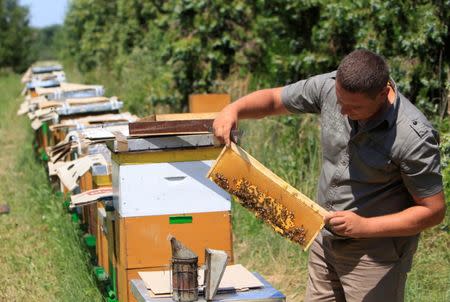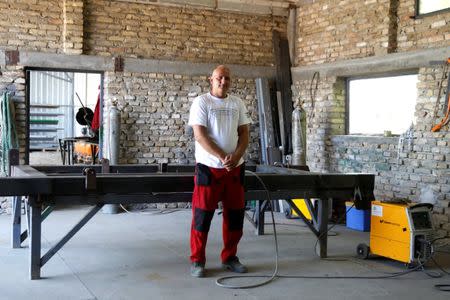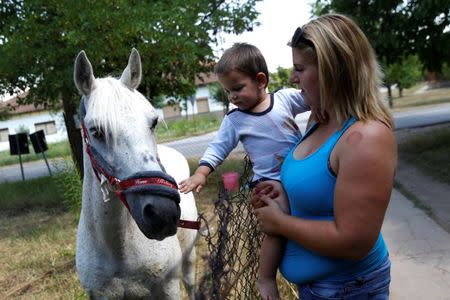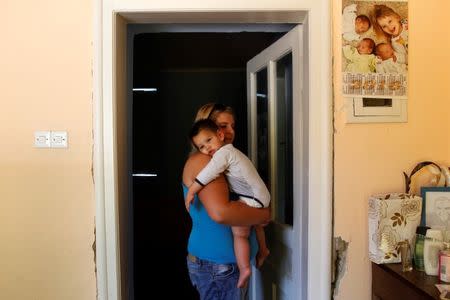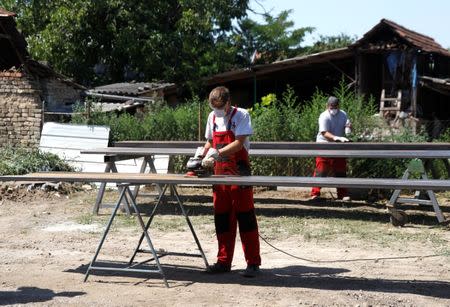Orban courts voters outside Hungary with grants, cheap loans
By Gergely Szakacs CANTAVIR, Serbia (Reuters) - Antal Kracsun was about to convert a barn next to his house into a pigsty to make ends meet, when a Hungarian government grant gave his small welding business in northern Serbia a shot in the arm. The 800,000-Serbian dinar ($7,600) grant under Prime Minister Viktor Orban's cross-border stimulus programme, for poorer, ethnic Hungarian regions in central Europe, enabled Kracsun to buy expensive welding machinery which would otherwise have been beyond his means. More than one million ethnic Hungarians live in neighbouring Serbia, Romania, Ukraine and elsewhere, descendants of Hungarians who found themselves outside their homeland when the country's borders were redrawn at the end of World War One. With a parliamentary election in April 2018 drawing closer, 54-year-old Orban is expanding his political arsenal to include ethnic Hungarians like Kracsun through grants and heavily-subsidised loans to small businesses. As a first step, Orban gave these ethnic Hungarians citizenship after a 2010 landslide, followed by voting rights. That helped Orban eke out a two-thirds parliamentary majority at the last election in 2014 as such voters overwhelmingly backed him. "Our workload has doubled," thanks to the new machinery purchased after receiving the grant, Kracsun said in the shade of his rudimentary workshop. "We have not had such an opportunity in this country or this region so far," Kracsun said, adding that he intended to support Orban's ruling right-wing Fidesz party next April because of the measures he was taking to support voters outside Hungary. "They take care of us. It is a good feeling. We have always felt Hungarian, regardless of the border." That sentiment was widespread in Vojvodina, a northern region in Serbia and home to about a 200,000-strong Hungarian community. Most of the ethnic Hungarians Reuters interviewed for this story and who were grant recipients plan to vote for Orban next year. TEMPLATE FOR ROMANIA Latest opinion polls show Orban's Fidesz party is a clear favourite to retain power in 2018. Political analysts said ethnic Hungarian voters could help Orban regain the two-thirds majority he has since lost. "It is in the government's interest to have these sympathetic voters turn up at the election in the largest possible numbers," said Attila Tibor Nagy, an analyst at the Centre for Fair Political Analysis think-tank. A two-thirds parliamentary majority enabled Orban to rewrite the constitution and pass major laws without support from other parties. The government in Budapest estimates ethnic Hungarian votes could sway two out of 199 seats in parliament. Of an 8.25 million-strong electorate, nearly 290,000 ethnic Hungarians are registered to vote, their ranks having increased since the last election. Orban's three-year, 50-billion-forint ($185 million) stimulus plan in Vojvodina could also be a template for a bigger programme in fellow European Union member Romania, home to the region's largest ethnic Hungarian community. Once a grant has been successfully applied for, it is disbursed through a local foundation linked to the Hungarian Foreign Ministry, which says the main goals of the scheme are to support local families and small businesses and to help ethnic Hungarians stay where they are. "PEOPLE DECIDE" Hundreds of thousands of Hungarians have moved to western Europe in search of higher-paid jobs over the past years and the latest census figures showed a fall in the number of ethnic Hungarians living in Serbia as well. "This programme is obviously part of the broader strategic concept launched seven years ago and I think this will continue," Deputy Secretary of State Peter Kiss-Parciu said. "I am sure this will motivate people to take a more active role in the matters of the Hungarian community," Kiss-Parciu said, when asked whether the funds could be a boon for Orban at the election, adding: "As to how people vote, that is for them to decide." Sitting on Hungary's southern border, Vojvodina is among Serbia's more developed regions, but even so, living standards languish below those in a neighbouring poor region of Hungary. Vojvodina, through which the Danube river flows, is the breadbasket of Serbia providing much of its grain and makes up about one quarter of its territory. The capital Novi Sad was heavily bombed in 1999 when NATO intervened to halt killing of ethnic Albanians in Kosovo by Serb forces. Daniel Ferencz, a beekeeper in the town of Backo Petrovo Selo, surrounded by lush forests and dazzling sunflower fields, received a grant of about 860,000 Serbian dinars, which he used to buy swarms of bees, 50 hives and a honey-bottling machine. Ferencz, 34, said the financial support convinced him he could make a living at home instead of moving elsewhere. "It is an uplifting feeling," he said near a colourful row of hives. "It is good to be a Hungarian here because no one else has ever provided similar support." For others, like Nikoletta Futo, 22, and her husband, who have a three-year-old daughter and triplet sons turning two in November, the 1.2-million-dinar grant also made the difference between staying and leaving the area. Using the grant and some savings, they were able to buy a bigger house on the outskirts of Kanjiza, just across the Hungarian border in Serbia. "We used to live in a smaller house with two rooms, but the six of us had to share a single room there," said Futo, with her daughter, Nora, sitting on her lap. LOW INTEREST RATES In the next phase of the programme, Hungarian OTP Bank's tiny Serbian unit will provide loans to Hungarian small businesses for projects worth over half a million euros each in agriculture and industry. Nearly three dozen such projects are being assessed, Kiss-Parciu said, adding government subsidies will allow companies to borrow at 1-2 percent interest, far below the Serbian base rate, which at 4 percent is the highest in the region. Deputy Chief Executive Laszlo Wolf told Reuters that OTP was looking to boost its low market share in Serbia and Romania, possibly through acquisitions. OTP declined further comment on its Serbian expansion plans. Officials in Belgrade were not available to comment about the grants and loans for this story but have not criticised Orban's stimulus plan. Then Prime Minister Aleksandar Vucic, who is now president, said at a joint government meeting in November relations between Serbia and Hungary have never been better. But not everyone is so happy. Hungary's Socialists, trailing far behind in the polls, say Orban is using Hungarians across the border as political tools, also criticising his stimulus programme for what they see as a lack of transparency. And, early last month, Serbian tabloid Kurir, a Vucic critic, ran a headline reading: "Orban takes over Vojvodina." (Writing by Gergely Szakacs; Additional reporting by Ivana Sekularac; Editing by Peter Millership)

 Yahoo News
Yahoo News 